ELCA Advocacy Office, Washington, D.C.
May 21, PRAY. FAST. ACT
On Monday, May 21, we join with the Episcopal Church in our monthly commitment to #PrayFastAct. This month, we center to focus on assistance to veterans and their family members.
New investments and policies in recent years have helped to expand veteran access to education, labor opportunities, healthcare and housing. Yet too many veterans, active service members and their families still struggle with complex challenges, ranging from barriers to benefits and increased mental health risks, to the impacts of the opioid crisis and more. Each returning service member has unique needs—and this month’s action supports effective public policies to meet those needs.
and housing. Yet too many veterans, active service members and their families still struggle with complex challenges, ranging from barriers to benefits and increased mental health risks, to the impacts of the opioid crisis and more. Each returning service member has unique needs—and this month’s action supports effective public policies to meet those needs.
Many ELCA rostered leaders have long served as chaplains in medical centers and on bases across the world. In addition to advocating with and for veterans, congregations can play very important roles in direct engagement. Hosting local events, such as 12-step recovery groups, are often an essential and much-needed service in communities. Training videos and resources for clergy and churches interested in engagement can be found on the Veterans Affairs webpage, and ELCA-specific resources for ministers and chaplains can be found at ELCAchaps.com.
FARM BILL TEXT RELEASED
The House Agriculture Committee marked up the first version of the 2018 farm bill in mid-April, sending it to the floor of the House of Representatives. The proposed bill, which would make significant changes to nutrition and anti-hunger programs such as SNAP, was cleared on a strict 26-20 party-line vote.
The farm bill covers a wide-encompassing set of policies, including rural development, international aid, conservation programs and more. Policies that curb hunger and malnutrition, support vibrant agricultural economies in rural communities, and promote the sustainable use of natural resources are critical values to the faith community. Interested advocates can learn more by reading the ELCA Farm Bill 101 fact sheet on the Advocacy Resource Page.
Numerous food banks, faith groups and service providers voiced concern over newly added work requirements and changes to SNAP eligibility in the bill, which could displace over a million people currently eligible for hunger assistance. ELCA Advocacy shared an action alert for advocates to take action on the Farm Bill shortly after the draft legislative text was released. Advocates are strongly encouraged to take action this month as Congress advances the bill.
EARTH DAY AND ADVOCACY BLOG SERIES
In celebration of Earth Day, ELCA Advocacy is pleased to share a blog series on faith and the environment. The series, written by Deacon Laura Heller of the Delaware-Maryland Synod, covers topical issues from relationships in our ecosystem, clean water, trees, lead pollution and more. Heller, a minister of Word and Service, serves as a Creation Care Ministry coordinator for the synod and makes compelling connections between faith, public policy, and God’s creation.
Interested advocates can take action today on environmental programs at the ELCA Action Center. As Heller observes, ‘Even Martin Luther, in his time, recognized the importance of our relationship with God through creation and he is quoted as saying, “God writes the Gospel not in the Bible alone, but also on trees, and in the flowers and clouds and stars.”’
HUD RENT REQUIREMENTS
The Department of Housing and Urban Development released a rent-reform bill in late April. The proposal would increase the amount low-income households pay for their rent, from 30 to 35 percent of their income, as well as add convoluted work requirements to various programs. For the lowest income people, the proposal would also triple the minimum monthly rent they must pay.
Nearly all faith traditions support policies that enhance dignity and economic opportunity for all. Increasing rents will do much more harm than good, and could make it even more difficult for millions of families to find good-paying jobs. ELCA Advocacy will send updates on the bill as it proceeds to Congress for approval.
Nearly all faith traditions support policies that enhance dignity and economic opportunity for all. Increasing rents will do much more harm than good and could make it even more difficult for millions of families to find good-paying jobs. ELCA Advocacy will send updates on the bill as it proceeds to Congress for approval.
Lutheran Office for World Community, United Nations, New York, N.Y.
Dennis Frado, director
CLIMATE JUSTICE DEMANDED: The 17th Session of the U.N. Permanent Forum on Indigenous Issues was held in New York April 16-27 under the theme “Indigenous peoples’ collective rights to lands, territories and resources.” Lutherans were represented at the forum by Prairie Rose Seminole, ELCA program director for American Indian Alaska Native Ministries.
The Lutheran Office for World Community, together with the United Methodist Women, Inspiraction and the 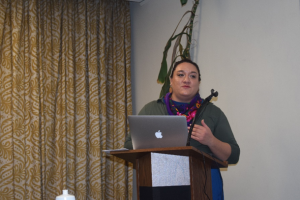 Southern Diaspora Research and Development Center, held a panel titled “Indigenous Women Demanding Climate Justice.” Prairie Rose joined this panel of indigenous women leaders from the United States, Ecuador and Kenya. The panel highlighted how “indigenous peoples protect 50 percent of the world’s land, but their territories, lands, sacred sites and resources continue to be stolen, seized, militarized and/or threatened without free, prior and informed consent.” The panel also highlighted how indigenous women are particularly affected by environmental pollution and climate change.
Southern Diaspora Research and Development Center, held a panel titled “Indigenous Women Demanding Climate Justice.” Prairie Rose joined this panel of indigenous women leaders from the United States, Ecuador and Kenya. The panel highlighted how “indigenous peoples protect 50 percent of the world’s land, but their territories, lands, sacred sites and resources continue to be stolen, seized, militarized and/or threatened without free, prior and informed consent.” The panel also highlighted how indigenous women are particularly affected by environmental pollution and climate change.
Read more about the U.N. Declaration on the Rights of Indigenous Peoples, which was adopted by the General Assembly in 2007.
California
Mark Carlson, Lutheran Office of Public Policy loppca.org
OVERCOMING SEVERE POVERTY: The Lutheran Office of Public Policy-California is part of an interfaith and wider anti-poverty coalition effort to reduce severe childhood poverty in California by supporting legislation and a budget request that the family grant levels for Temporary Assistance for Needy Families (TANF)/CalWORKS be set at 50 percent of the federal poverty income level and indexed for future increases in the poverty level. Budget hearings have been held, and SB 982 passed the Senate Human Services Committee on April 24. The evidence continues to mount that severe childhood poverty has long-lasting and costly consequences.
HEALTHY DEMOCRACY: LOPP-CA offered brief testimony in the Assembly Elections and Redistricting Committee in support of AB 2188 that would establish disclosure requirements for paid political ads on social media platforms. Supporters gathered in the Assembly chambers to celebrate success in committee and hear from the bill’s author, Kevin Mullin, and the leader of the Clean Money Campaign, Trent Lange. While the focus of LOPP-CA is on June ballot measures, the November ballot may contain several initiatives that promise to vex voters. As social media grows in influence and the potential for deception, especially by wealthy interests, bills like AB 2188 will help shed light and level the playing field.
LOOKING AHEAD: We are thrilled that Sacramento City Councilmember Eric Guerra, a legislative staffer with a compelling personal story of resilience, will be the LOPP-CA breakfast speaker at the Sierra Pacific Synod Assembly on June 2, meeting under the theme “We Are Church Together: These Are Our Neighborhoods.” With homelessness, the shooting of Stephon Clark and immigration on many people’s minds, it will be an informative and inspiring morning.
Colorado
Peter Severson, Lutheran Advocacy Ministry-Colorado lam-co.org
LEGISLATIVE SESSION NEARS END: The General Assembly has just two more weeks of session before adjourning for the year, with nearly 300 bills yet to be acted upon. Legislators will be meeting late into the evening for the remaining working days. We continue to support important bills that are still alive related to paid family leave (HB 1001), expanding the School Lunch Protection Act (SB 13), and extending the state’s civil rights division (HB 1256). We have also joined a coalition to support HCR 1002, which would add a question to our November ballot asking voters to abolish slavery in the Colorado Constitution. Finally, we are opposing an anti-sanctuary bill (SB 220).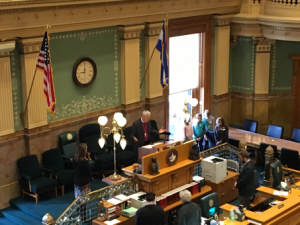
CIVIL RIGHTS OP-ED: Pastor Daniel Smith, from Ascension Lutheran Church in Colorado Springs, wrote an op-ed for Colorado Politics in support of the reauthorization of the Civil Rights Division. You can read the full op-ed here: coloradopolitics.com/religious-exemption-in-states-anti-discrmination-laws-only-would-add-injustice/.
BISHOP OFFERS PRAYERS: Rocky Mountain Synod Bishop Jim Gonia offered prayers at two public events recently. On April 19, he joined students and faith leaders at Clement Park, next to Columbine High School, on the eve of the anniversary of the 1999 shooting and shared a prayer from Evangelical Lutheran Worship asking God to grant healing, peace and courage. The next morning, he prayed the same prayer in front of the Colorado House of Representatives. It was a powerful witness to two important groups in our state.
Minnesota
Tammy Walhof, Lutheran Advocacy-Minnesota tammy@lcppm.org
LEGISLATIVE SESSION: Early pledges of bipartisanship have been replaced by political gamesmanship. Aligning Minnesota laws with recent federal tax changes is exacerbating divisions and will affect whether many Minnesotans pay the price through higher taxes or program cuts.
AFFORDABLE HOUSING: Kendrick and Tammy continue to build relationships with congregations, youth groups, pastors and lay leaders – resulting in many letters to legislators of specific districts. Appropriation requests for rental assistance for severely mentally ill people (Bridges) and one-time matching dollars for Local Housing Trust Funds have both died. Homework Starts at Home (to increase stability of families with school age children) still has a chance for increased base funding. However, there is still time to contact legislators about our $140 million Homes for All bonding request. See LutheranAdvocacyMN.org for talking points.
CLEAN ENERGY: We continue to work with several churches and attendees of our Faith & Clean Energy Campaign events to create clean energy legislative champions. Unfortunately, there are no longer any clear paths to improve Minnesota’s Renewable Energy Standard this year. We’ve been working with partners to prevent legislative efforts to diminish public voice in energy decisions while instead giving more power and voice to fossil fuel industries and power companies.
Join us May 21 at 11 a.m. (last day of session) to deliver our clean energy sign-on letter and generate momentum for 2019!
Watch Facebook for urgent action alerts!When the session ends, continue watching for ways to build toward the 2019 state legislative session and to address federal issues with our members of Congress!
New Mexico
Ruth Hoffman, Lutheran Advocacy Ministry-New Mexico lutheranadvocacynm.org
LAM-NM PO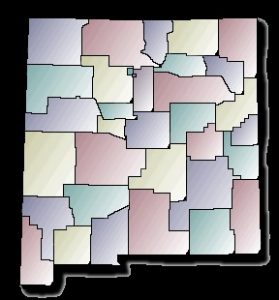 LICY COMMITTEE MEETS: The LAM-NM Policy Committee met in April at All Saints Lutheran Church in Albuquerque. The Policy Committee is composed of members of ELCA congregations from around New Mexico, including Las Cruces, Los Alamos, Santa Fe and Albuquerque. The committee also includes a representative from the Presbytery of Santa Fe, which is in an advocacy partnership with LAM-NM. The committee reviewed the LAM-NM Bishop’s Legislative Luncheon and Issues Briefing, the successes and disappointments from the legislative session, worked on plans for the fall Advocacy Conference, elected new members and reviewed various reports. The Policy Committee members from southern New Mexico joined the meeting via Zoom to save traveling 450 miles roundtrip to attend. “Thanks” were given for technology!
LICY COMMITTEE MEETS: The LAM-NM Policy Committee met in April at All Saints Lutheran Church in Albuquerque. The Policy Committee is composed of members of ELCA congregations from around New Mexico, including Las Cruces, Los Alamos, Santa Fe and Albuquerque. The committee also includes a representative from the Presbytery of Santa Fe, which is in an advocacy partnership with LAM-NM. The committee reviewed the LAM-NM Bishop’s Legislative Luncheon and Issues Briefing, the successes and disappointments from the legislative session, worked on plans for the fall Advocacy Conference, elected new members and reviewed various reports. The Policy Committee members from southern New Mexico joined the meeting via Zoom to save traveling 450 miles roundtrip to attend. “Thanks” were given for technology!
Ohio
Nick Bates, Hunger Network Ohio Nick@HungerNetOhio.org
A busy April in Ohio!
UNITE TO END RACISM: The month began with many people from around the state traveling to the Unite to End Ra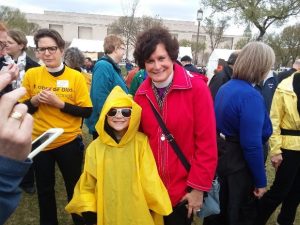 cism Rally in Washington, D.C., – including Samuel, age 8 of Columbus. “I think it is dumb that kids couldn’t go to school together because of their skin color,” Sammie said, “I am happy that we fixed that, but we have more to do to stop violence against people because of their skin color.”
cism Rally in Washington, D.C., – including Samuel, age 8 of Columbus. “I think it is dumb that kids couldn’t go to school together because of their skin color,” Sammie said, “I am happy that we fixed that, but we have more to do to stop violence against people because of their skin color.”
Sammie stands with Bishop Suzanne Dillahunt from the Southern Ohio Synod (left) and Sammie and Pastor John Wallace (HNO Board member and a colleague in the United Methodist Church) watch as the silent march begins from the Martin Luther King Jr. memorial to the rally.
HUNGER LEADER FELLOWSHIP: Ohio will host a World Hunger Advocacy Leader Fellowship. This full-time, paid fellowship will begin in August and last for a year for interested individuals who are considering careers in advocacy, justice and ministry and are looking for professional experience. Some college is preferred. The chosen applicant will have the opportunity to learn and participate in advocating on important issues to reduce hunger in Ohio. Click here to apply!
PRIMARY ELECTION ON MAY 8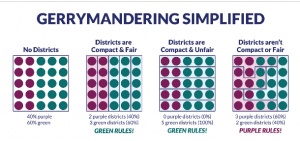 : Click here for our resources on State Issue 1 to distribute to your congregations and encourage them to vote to end gerrymandering in Ohio. Issue 1 will allow elected public servants to focus on serving their community and not only special and partisan interests.
: Click here for our resources on State Issue 1 to distribute to your congregations and encourage them to vote to end gerrymandering in Ohio. Issue 1 will allow elected public servants to focus on serving their community and not only special and partisan interests.
Pennsylvania
Tracey DePasquale, Lutheran Advocacy-Pennsylvania lutheranadvocacypa.org
STATE HUNGER COALITION: Staff attended the bi-annual meeting of the PA Hunger Action Coalition. Updates were provided by task force panels focused on: SNAP (Supplemental Nutrition Assistance Program) and seniors; the farm bill; school breakfast; Summer Food Program; and the state and federal budget and SNAP.
ADVOCACY ALERTS: Advocacy Alerts opposing HB 1659 – SNAP work requirements and HB 2138 and HB 2024 Medicaid work requirements were shared with constituents. Each of these bills would harm Pennsylvanians by making it more difficult for them to qualify for and keep the health coverage and food assistance they need to stay healthy. Passage would require extensive new bureaucracies to administer these requirements, wasting state and federal Medicaid dollars on unnecessary administrative burdens and new red tape.
LUTHERAN DAY 2018: Arrangements are being finalized for Lutheran Day, May 21. The day’s events will include learning, worship, recognition of advocacy honorees from across the state, legislative advocacy visits and a keynote address by Dr. Richard Alley, Evan Pugh Professor of Geosciences at the Pennsylvania State University, who was a member of the Intergovernmental Panel on Climate Change that received the 2007 Nobel Peace Prize. Learn more.
HOLOCAUST REMEMBRANCE DAY: Staff attended the annual Holocaust Remembrance at the Capitol on April 11. Every year the PA Jewish Coalition sponsors a civic Holocaust Remembrance Day honoring the victims, children and grandchildren.
ELCA DOMESTIC MISSION STAFF TRAINING: LAMPa staff attended the training in Chicago networking, learning and worshiping with colleagues from across the country.
Washington
Paul Benz, Faith Action Network fanwa.org
ECUMENICAL ADVOCACY DAYS – A WORLD UPROOTED: Two members of the FAN staff and a few advocates joined the Washington delegation to Ecumenical Advocacy Day in Washington, D.C., in April. The delegation brought personal stories to congressional staff and asked that Congress redirect funding away from deportation, detention and border militarization and reinvest in refugee resettlement and in addressing the root causes of migration around the world: conflict, corruption, poverty and the effects of climate change.
REGIONAL SPRING SUMMITS: Every year in May and June, FAN hosts spring summits around the state in order to connect with the network, share opportunities for advocacy and strategize for the upcoming year. Areas of focus include economic justice, health care, immigration, criminal justice, housing and homelessness, and the environment. Learn more on our website: fanwa.org/events-2/regional-spring-summits.
INITIATIVE 1631: FAN is one of two faith organizations joining a 150-member coalition called the Alliance for Jobs and Clean Energy, which is working on a ballot initiative that will reduce pollution and invest in clean air, clean energy, clean water, healthy forests and healthy communities by putting a price on carbon ($15 per ton of emissions). Advocates and faith communities are mobilizing to gather signatures; we have 10 weeks to gather 260,000 for the initiative to qualify for the ballot in November.
Wisconsin
Cindy Crane, Lutheran Office for Public Policy in Wisconsin loppw.org
UNITE AGAINST RACISM: The director joined Wisconsinites organized by the Wisconsin Council of Churches to attend Unite Against Racism in Washington, D.C. The National Council of Churches event commemorated the anniversary of the death of the Martin Luther King Jr. The director was quoted in the Washington Post.
LOPPW Advisory Council Member Deb Martin from the East Central Synod walked in the silent march next to ELCA Presiding Bishop Elizabeth Eaton. The director also attended a bystanders-intervening training in Milwaukee.
CARE FOR GOD’S CREATION: LOPPW participated in an all-day Wisconsin Climate Table meeting that included strategizing on how to diversify our table and participating in an anti-racism training.
The director worked on a manual for the South-Central Synod of Wisconsin/LOPPW Care for God’s Creation team. Another team member will add to the draft. We made upcoming presentations known via our website and social media.
PUBLIC BENEFITS BILLS: LOPPW met with the public benefits coalition to strategize how to work with the organizations that are tasked with implementing the changes mandated in the six bills that passed and on a values statement. We are concerned changes will not adequately be made known to recipients and many will fall through the cracks.
LUTHERAN SOCIAL SERVICES: The director met with Hector Colon, the director of Lutheran Social Services of Wisconsin and Upper Michigan to discuss possibly working together to educate members about our efforts and do advocacy. With input from Greater Milwaukee Synod Bishop Paul Erickson, we also discussed a possible event in Milwaukee.











